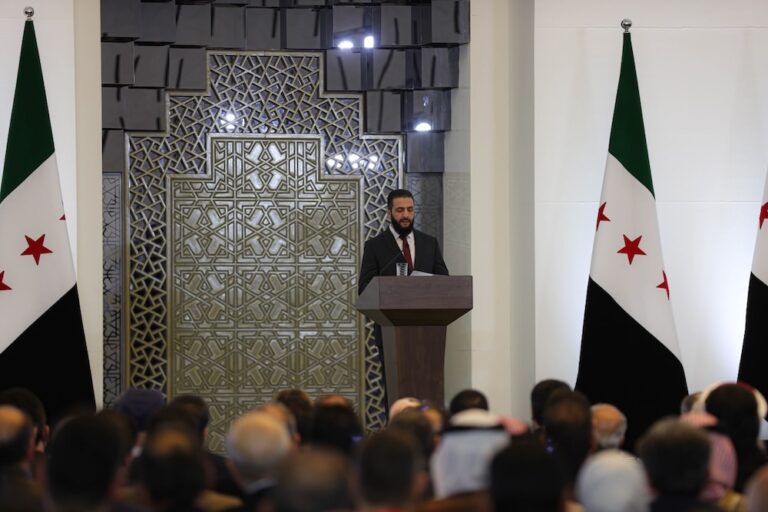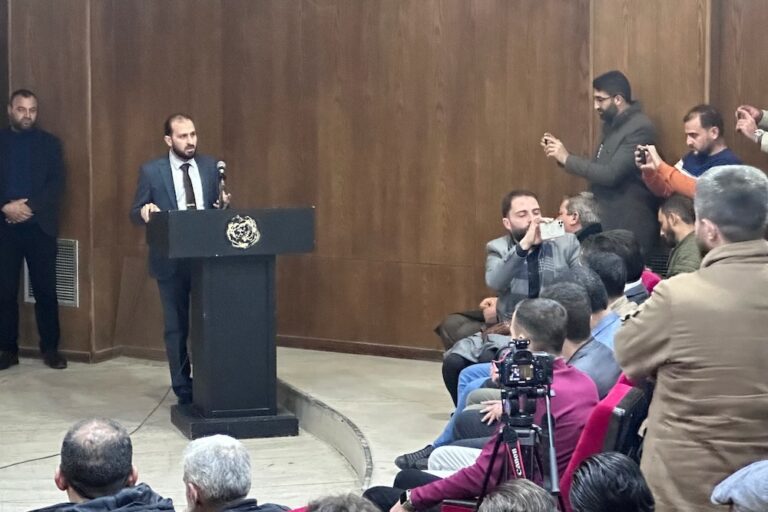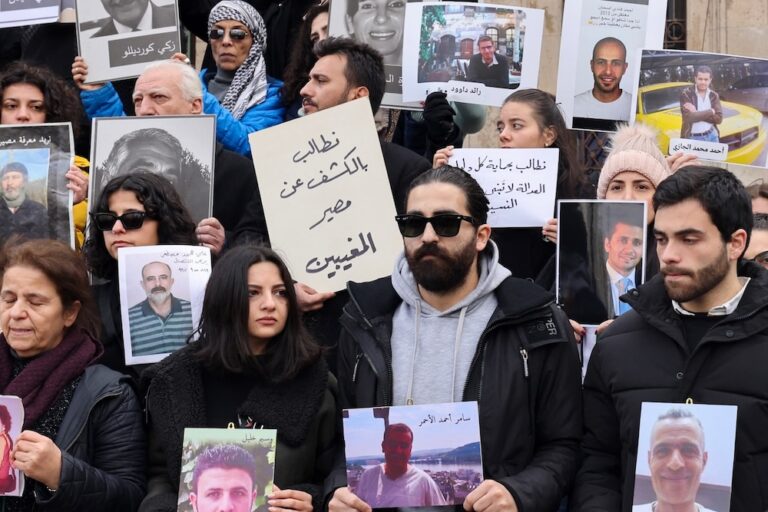(IPI/IFEX) – The following is a 7 October 2002 IPI letter to French President Jacques Chirac, on the occasion of his upcoming official state visit to Syria: His Excellency Jacques Chirac President of the Republic of France Palais de l’Elysée 55, rue du Faubourg-Saint-Honoré F 75008 Paris Fax: +33.1.42.92.81.00 Vienna, 7 October 2002 Your Excellency, […]
(IPI/IFEX) – The following is a 7 October 2002 IPI letter to French President Jacques Chirac, on the occasion of his upcoming official state visit to Syria:
His Excellency Jacques Chirac
President of the Republic of France
Palais de l’Elysée
55, rue du Faubourg-Saint-Honoré
F 75008 Paris
Fax: +33.1.42.92.81.00
Vienna, 7 October 2002
Your Excellency,
On the eve of your official state visit to Syria as part of your Middle East tour in mid-October, the International Press Institute (IPI) wishes to bring to your attention the ongoing campaign of harassment and intimidation against the family of Syrian journalist Nizar Nayyouf. As a result of their refusal to publicly condemn Nayyouf’s public statements as lies, the family has suffered greatly at the hands of the Syrian authorities. IPI would also like to relate to Your Excellency some other recent press freedom violations in the country.
The Nayyouf family has faced continuous violence, harassment and the threat of forced exile as a result of Nizar Nayyouf’s brave challenge of the lack of press freedom in Syria. His family members have been brutally attacked in the streets by the authorities. They have lost their jobs and been prevented from attending university. Their telephone lines have also been cut. Unable to contact the outside world and for fear of further attacks, the family lives under de facto house arrest in almost total isolation. This year saw the issuing of a fatwa permitting Alawate sect members to commit criminal and violent acts against both Nizar and the Nayyouf family. Forced to live off the father’s meagre US$35 monthly pension, the family’s situation has become increasingly difficult. Despite this, the family conducted a hunger strike in December 2001 in a desperate attempt to gain international support. However, their protest largely went unnoticed.
The Nayyouf family’s struggle dates back to Nizar Nayyouf’s 1992 arrest and subsequent 10 years’ imprisonment for being a member of the banned Independent Committee for the Defence of Democratic Freedoms and Human Rights in Syria and for reporting human rights violations during the 1991 presidential elections. While in jail, Nayyouf was tortured and beaten so severely that he was partially paralysed from the waist down and nearly blinded.
The campaign against the Nayyouf family comes at a time when the journalist is in France receiving medical treatment, including chemotherapy, necessitated by his years of confinement and torture. Because of the injuries received by Nayyouf at the hands of his torturers, IPI feels there is a need to publicise the case whenever heads of state and government travel to Syria. Moreover, IPI firmly believes the Syrian government’s policies may be influenced by international opposition. Evidence for this may be seen in the original decision to release Nayyouf in May 2001. Since his release, Nayyouf has become the chairman of the Arab Organisation for the Defence of the Press and Freedom of Expression, and he has published several critical reports about the lack of press freedom in Syria. In response to this, the persecution of both him and his family has intensified.
Unfortunately, concern for the plight of Nayyouf and his family appears to be diminishing among members of the international community, despite the continuation of the violence. Indeed, it appears the violence has simply shifted to the journalist’s family.
If the political statements of the Syrian president, Bashar al-Assad, were the measure of political reform, Syria would indeed seem to be moving in the direction of openness and greater freedom. However, as the case of Nizar Nayyouf and his family proves, political reform is merely a statement, whereas oppression is an everyday reality in Syria. After inspiring beleaguered journalists everywhere with his fight against oppression, it is now Nizar Nayyouf’s family that serves as a reminder that the struggle for freedom of expression carries a high price.
IPI is also very worried about the Syrian authorities’ decision in September this year to issue arrest warrants for Ghosob al-Malla, Mohammad Farouq al-Homsi and Mohammad Kheir Beik on a charge of circulating a publication on the human rights situation in Syria without a licence. An arrest warrant has also been issued for Haitham al-Maleh, head of the Human Rights Association of Syria (HRAS), who is in Jordan for medical care and who is also accused of spreading lies outside the country. The HRAS says it had sent a copy of its magazine Tayyarat (Currents), printed in Beirut, to the Syrian president, Bashar al-Assad, and had been preparing to apply for a licence. Maleh, Homsi and Kheir Beik are accused of joining a political association of international character without government permission and issuing a publication that stirs national rifts. Malla is accused of involvement in the publication.
In addition, IPI is deeply concerned by the refusal of the Syrian authorities to renew the press credentials of the Agence France Presse (AFP) foreign correspondent Maher Chmaytelli, a French passport holder of Lebanese origin. According to the information before IPI, Chmaytelli was accredited in October 2000 to work in Syria where he was the only resident foreign media correspondent. Despite having worked in compliance with AFP rules and having never violated Syrian publication laws, the authorities advised Chmaytelli in March this year that his accreditation would not be renewed. Media sources reported that Chmaytelli had been accused of reporting outside the standard government line, and thereby of working against Syrian interests.
IPI, the global network of editors, media executives and leading journalists, urges Your Excellency to condemn the ongoing campaign against Nizar Nayyouf and his family, to urge a repeal of the arrest warrants against Malla, Maleh, Homsi and Kheir Beik, to condemn Syria’s refusal to renew Chmaytelli’s press accreditation, and to raise these issues during your talks with President al-Assad, thereby addressing the wider issues of basic human rights and true political reform within Syria.
We thank you for your attention.
Yours sincerely,
Johann P. Fritz
Director
Recommended Action
Similar appeals can be sent to:His Excellency Jacques Chirac
President of the Republic of France
Palais de l’Elysée
55, rue du Faubourg-Saint-Honoré
F 75008 Paris
France
Fax: +33 1 42 92 81 00Please copy appeals to the source if possible.


